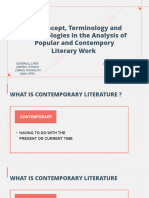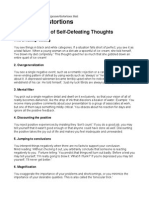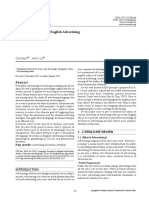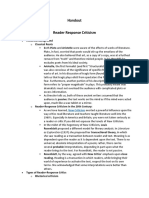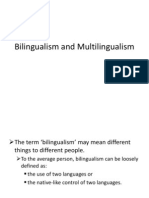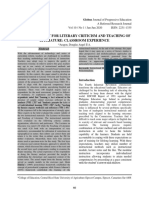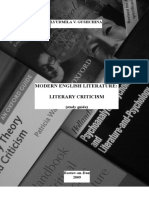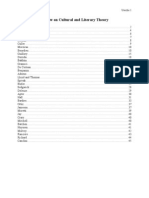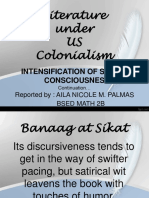0 ratings0% found this document useful (0 votes)
634 viewsDepartmental Presentation: Mikhail Bakhtin and His Theory of Dialogism
Departmental Presentation: Mikhail Bakhtin and His Theory of Dialogism
Uploaded by
jaswinderThis document provides an overview of Mikhail Bakhtin's theory of dialogism through a departmental presentation. It summarizes Bakhtin's major works, key concepts around dialogism including heteroglossia, the intersubjective nature of language, and literature as social discourse. Bakhtin viewed language as dialogic rather than unitary, and the world as an open-ended process shaped through dialogue rather than monologue. Literature, for Bakhtin, was a social form that brings different voices and perspectives into interaction.
Copyright:
© All Rights Reserved
Available Formats
Download as PPT, PDF, TXT or read online from Scribd
Departmental Presentation: Mikhail Bakhtin and His Theory of Dialogism
Departmental Presentation: Mikhail Bakhtin and His Theory of Dialogism
Uploaded by
jaswinder0 ratings0% found this document useful (0 votes)
634 views16 pagesThis document provides an overview of Mikhail Bakhtin's theory of dialogism through a departmental presentation. It summarizes Bakhtin's major works, key concepts around dialogism including heteroglossia, the intersubjective nature of language, and literature as social discourse. Bakhtin viewed language as dialogic rather than unitary, and the world as an open-ended process shaped through dialogue rather than monologue. Literature, for Bakhtin, was a social form that brings different voices and perspectives into interaction.
Original Description:
Analytical description of some Bakhtinian terminologies
Original Title
Presentation on Bakhtin
Copyright
© © All Rights Reserved
Available Formats
PPT, PDF, TXT or read online from Scribd
Share this document
Did you find this document useful?
Is this content inappropriate?
This document provides an overview of Mikhail Bakhtin's theory of dialogism through a departmental presentation. It summarizes Bakhtin's major works, key concepts around dialogism including heteroglossia, the intersubjective nature of language, and literature as social discourse. Bakhtin viewed language as dialogic rather than unitary, and the world as an open-ended process shaped through dialogue rather than monologue. Literature, for Bakhtin, was a social form that brings different voices and perspectives into interaction.
Copyright:
© All Rights Reserved
Available Formats
Download as PPT, PDF, TXT or read online from Scribd
Download as ppt, pdf, or txt
0 ratings0% found this document useful (0 votes)
634 views16 pagesDepartmental Presentation: Mikhail Bakhtin and His Theory of Dialogism
Departmental Presentation: Mikhail Bakhtin and His Theory of Dialogism
Uploaded by
jaswinderThis document provides an overview of Mikhail Bakhtin's theory of dialogism through a departmental presentation. It summarizes Bakhtin's major works, key concepts around dialogism including heteroglossia, the intersubjective nature of language, and literature as social discourse. Bakhtin viewed language as dialogic rather than unitary, and the world as an open-ended process shaped through dialogue rather than monologue. Literature, for Bakhtin, was a social form that brings different voices and perspectives into interaction.
Copyright:
© All Rights Reserved
Available Formats
Download as PPT, PDF, TXT or read online from Scribd
Download as ppt, pdf, or txt
You are on page 1of 16
At a glance
Powered by AI
Some of the key takeaways from the document are that Bakhtin proposed concepts like dialogism, heteroglossia and the idea that language and meaning are shaped through social interaction and discourse.
Some of Bakhtin's major works discussed are Problems in the Work of Dostoevsky, Discourse in the Novel, The Problem of Speech Genres, Problems of Dostoevsky’s Poetics and Rabelais and His World.
Important concepts proposed by Bakhtin include heteroglossia, dialogism, the idea that meaning is shaped through social interaction, and concepts like simultaneity, architectonic and outsidedness.
Departmental Presentation
Mikhail Bakhtin and His Theory of Dialogism
Department of Humanities and Social Sciences
Indian Institute of Technology, Ropar
Jaswinder Singh
Ph D scholar HSS
16/09/2014
Mikhail Bakhtin: Major works
Art and Answerability (1919), Author and Hero in Aesthetic Activity
(1920-24), The Problem of Content, Material and Form in Verbal Art
(1924) as in Art and Answerability: Early Philosophical Works by M M
Bakhtin ed. Michael Holquist and Vadim Liapinov, University of Texas Press,
1990.
Problems in the Work of Dostoevsky (1929) trans. by Caryl Emerson in
Rethinking Bakhtin: Extensions and Challenges, Northwestern University
Press, 1989.
Discourse in the Novel (1934-38) From the Prehistory of Novelistic
Discourse (1940), Epic and Novel (Toward a methodology for the
study of the novel) (1941) as in The Dialogic Imagination: Four Essays by
M M Bakhtin ed. Michael Holquist, University of Texas Press, 1981.
The Problem of Speech Genres (1951-52) as in Speech Genres and
Other Late Essays ed. Michael Holquist and Caryl Emerson, University of
Texas Press, 1986.
Problems of Dostoevskys Poetics ed. and trans. Caryl Emerson,
Minneapolis University Press, 1963.
Rabelais and His World, trans. Helene Iswolsky, Indiana University Press,
1984.
Mikhail Bakhtin and Dialogism
Nature/Culture
Dialectic/Dialogue
Mikhail Bakhtin and Dialogism
Authority/monologue vs. Dialogue
Self and the Other
Mikhail Bakhtin and Dialogism
Is language
Unitary/centralized/centripetal?
Passive/abstract?
Neutral/impersonal?
Mikhail Bakhtin and Dialogism
Heteroglossia
Individual consciousness
Social Consciousness
Mikhail Bakhtin and Dialogism
World: an open ended/ unfinalized process
Idea never finalizes
Sign/Word/utterance has two sided directionality
Idea/word/utterance: intersubjective territory
Mikhail Bakhtin and Dialogism
Important Quotations:
The living utterance, having taken meaning and shape at a
particular historical moment in a socially specific environment, can
not fail to brush up against thousands of living dialogic threads,
woven by socio-ideological consciousness around the given object
of utterance; it cannot fail to become an active participant in social
dialogue. (The Dialogic Imagination, 276)
Any utterance- from a short (single word) rejoinder in everyday
dialogue to the large novel or scientific treatise- has, so to speak, an
absolute beginning and an absolute end; its beginning is preceded
by the utterances of others, and its end is followed by the
responsive utterances of others. (Speech Genres and Other Late
Essays, 71)
Mikhail Bakhtin and Dialogism
Important concepts:
Simultaneity
Architectonic
Outsidedness
Mikhail Bakhtin and Dialogism
Literature:
A mere sign?
Informatory or communicative?
Individual or social?
An utterance/ an ideological form: a realization of ideas
Mikhail Bakhtin and Dialogism
Some dialogic tools:
Irony
Parody
Humor
Allusions
Mikhail Bakhtin and Dialogism
Recontextualization/reversal of figure
-ground metaphor
Center
Margin
Margin at center
center at margin
Mikhail Bakhtin and Dialogism
Epic vs. Novel:
Epic: a dead genre
Novel: a novelizing process
Mikhail Bakhtin and Dialogism
Novel as social discourse:
Discourse of instruction
Not based on memory or mere imagination
Multi styled and multi languaged
Everyday language
Contemporary life
Open to future
Mikhail Bakhtin and Dialogism
Bakhtin in Indian context:
Is Indian ideological tradition dialogic?
Thank you!
You might also like
- Key Concepts, Terminology, Methodologies in The Analysis of Popular and Contemporary Literary WorkDocument27 pagesKey Concepts, Terminology, Methodologies in The Analysis of Popular and Contemporary Literary WorkjhaizahomeresNo ratings yet
- Step Template 1-7 CompleteDocument26 pagesStep Template 1-7 Completeapi-547839068100% (1)
- Business Studies Exam Questions: Glossary of Command WordsDocument12 pagesBusiness Studies Exam Questions: Glossary of Command WordsHala ElhasairiNo ratings yet
- Cognitive Distortions Handout (Revised Byui)Document2 pagesCognitive Distortions Handout (Revised Byui)api-291366747No ratings yet
- GE CaseDocument3 pagesGE CaseAndrea AlvarezNo ratings yet
- Jaegwon Kim - Supervenience and MindDocument395 pagesJaegwon Kim - Supervenience and MindIMM100% (3)
- Language Deviation in English Advertising: Chi Ren Hao YuDocument5 pagesLanguage Deviation in English Advertising: Chi Ren Hao YuLea FranciscoNo ratings yet
- Literary Analysis:: Structuralist PerspectiveDocument17 pagesLiterary Analysis:: Structuralist PerspectiveJosh RoxasNo ratings yet
- Elec 1 Stylistics and Discourse Analysis Module 1Document5 pagesElec 1 Stylistics and Discourse Analysis Module 1Ken PepitoNo ratings yet
- Ashcroft (Cáp. 9)Document4 pagesAshcroft (Cáp. 9)cookinglikeNo ratings yet
- Reader Response Theory PDFDocument3 pagesReader Response Theory PDFShravya ShrutiNo ratings yet
- Cognitive Theory of Language LearningDocument3 pagesCognitive Theory of Language LearningINo ratings yet
- 1 Good Translation Art Craft ScienceDocument11 pages1 Good Translation Art Craft ScienceAdriana CarusoNo ratings yet
- Ideology in AdvertisingDocument10 pagesIdeology in AdvertisingKatiambo DavidNo ratings yet
- Lecture3 - TESTING AND EVALUATION PDFDocument45 pagesLecture3 - TESTING AND EVALUATION PDFNur Aliaa AjlaaNo ratings yet
- BilingualismDocument24 pagesBilingualismAisha ChoudharyNo ratings yet
- Types and Characteristics of TranslationDocument4 pagesTypes and Characteristics of TranslationAcademic JournalNo ratings yet
- Formalism and New Criticism 1Document20 pagesFormalism and New Criticism 1ALPETCHE, Venjie Ann R.100% (1)
- Learning Contract Subject Code Name Semester / Credit Lecturer Study Program Academic YearDocument4 pagesLearning Contract Subject Code Name Semester / Credit Lecturer Study Program Academic YearElly RahmawatiNo ratings yet
- Post-Colonial CriticismDocument4 pagesPost-Colonial Criticismnurfilza16-145No ratings yet
- Ecocriticism inDocument11 pagesEcocriticism insohamgaikwadNo ratings yet
- Literary Criticism in The PhilippinesDocument9 pagesLiterary Criticism in The PhilippinesMaria Cristina C. MolinaNo ratings yet
- StructuralismDocument10 pagesStructuralismnatitvzandtNo ratings yet
- Indian LiteratureDocument18 pagesIndian LiteratureDaryl Jan SalemNo ratings yet
- History of Literary CriticismDocument24 pagesHistory of Literary CriticismSara AbdullahNo ratings yet
- EnglishDocument19 pagesEnglishTesfu HettoNo ratings yet
- Morphology: Word Formation Processes: LinguisticsDocument29 pagesMorphology: Word Formation Processes: LinguisticsSylvaen WswNo ratings yet
- History of Literary TranslationDocument7 pagesHistory of Literary Translationnoel chris manlangitNo ratings yet
- Modern English Literature: Literary Criticism: Lyudmila V. GushchinaDocument62 pagesModern English Literature: Literary Criticism: Lyudmila V. Gushchinasabbar abderrahmaneNo ratings yet
- World Lit Report Arabian NightsDocument18 pagesWorld Lit Report Arabian NightsRoseAnnNooraNo ratings yet
- What Is Literature?: Reading, Assessing, AnalyzingDocument30 pagesWhat Is Literature?: Reading, Assessing, AnalyzingMelvin6377No ratings yet
- Review On Cultural and Literary Theory: Useche 1Document45 pagesReview On Cultural and Literary Theory: Useche 1Mauricio ZabalgoitiaNo ratings yet
- Periods in World Literature: Dr. Fatima DarDocument36 pagesPeriods in World Literature: Dr. Fatima DarHajra MirNo ratings yet
- Canterbury Tales PowerpointDocument9 pagesCanterbury Tales PowerpointGneizeeyNo ratings yet
- Theories in ShortDocument7 pagesTheories in ShortNaveed AkhterNo ratings yet
- Modern LiteratureDocument17 pagesModern LiteratureGledis GjuziNo ratings yet
- FormalismDocument20 pagesFormalismSuŁjićć MersiihaNo ratings yet
- A Critical Overview of Literary Criticism in English LiteratureDocument13 pagesA Critical Overview of Literary Criticism in English LiteratureSIMHACHALAM THAMARANANo ratings yet
- Municative Language Teaching. ApproachDocument3 pagesMunicative Language Teaching. ApproachgunayNo ratings yet
- Formalism and New CriticismDocument50 pagesFormalism and New CriticismLIAO LILINo ratings yet
- Literature Under US ColonialismDocument44 pagesLiterature Under US ColonialismAila Elocin PalmasNo ratings yet
- Media LiteracyDocument32 pagesMedia LiteracyJulieses Faith GonzalesNo ratings yet
- Anglo-French/ Medieval English Literature: Group 5Document17 pagesAnglo-French/ Medieval English Literature: Group 5Alistair SelorioNo ratings yet
- Reader ResponseDocument14 pagesReader ResponseReniel DomingoNo ratings yet
- World LiteratureDocument5 pagesWorld LiteratureCelly TemplonuevoNo ratings yet
- Survey of Philippine Literature in EnglishFirstSemSY2023 2024 AutosavedDocument29 pagesSurvey of Philippine Literature in EnglishFirstSemSY2023 2024 AutosavedDaisy Mae Tedlos100% (1)
- 3.1. Linguistic Relativity: Chapter No. 03Document15 pages3.1. Linguistic Relativity: Chapter No. 03Muhammad Furqan Aslam AwanNo ratings yet
- English Literature Vs American LiteratureDocument2 pagesEnglish Literature Vs American LiteraturePramod KumarNo ratings yet
- Notes On StructuralismDocument3 pagesNotes On StructuralismElise Dalli100% (1)
- Introduction To Indian Literature in EnglishDocument3 pagesIntroduction To Indian Literature in Englishsharmila100% (1)
- LECTURE I BakhtinDocument6 pagesLECTURE I BakhtinAshok Mohapatra100% (1)
- Expressive Means and Stylistic DevicesDocument33 pagesExpressive Means and Stylistic DevicesOlga SmochinNo ratings yet
- Lexico GrammarDocument42 pagesLexico GrammarSabarlah Dirikuy100% (1)
- Feminist Stylistics: Language and Gender Studies Critical Issues and Topics Linguistic FeminismDocument7 pagesFeminist Stylistics: Language and Gender Studies Critical Issues and Topics Linguistic FeminismSofiya Figura0% (1)
- Postcolonial Studies 1Document7 pagesPostcolonial Studies 1Billy AmineNo ratings yet
- L2 - Is Linguistics A Science - Terminology and NotationDocument12 pagesL2 - Is Linguistics A Science - Terminology and NotationMeme LashNo ratings yet
- A Very Brief Overview of Contemporary LiteratureDocument2 pagesA Very Brief Overview of Contemporary Literaturefaki88100% (3)
- Stylistics and Discourse Analysis - Prelim ModuleDocument16 pagesStylistics and Discourse Analysis - Prelim ModuleMartin Dave EnopequisNo ratings yet
- History of English Literature - Introduction, Literary Periods, Infographic TimelineDocument36 pagesHistory of English Literature - Introduction, Literary Periods, Infographic Timelinehusnasohail486No ratings yet
- A Study Guide for Nadine Gordimer's "Once Upon a Time"From EverandA Study Guide for Nadine Gordimer's "Once Upon a Time"Rating: 5 out of 5 stars5/5 (1)
- A Study Guide for Derek Walcott's "Dream on Monkey Mountain"From EverandA Study Guide for Derek Walcott's "Dream on Monkey Mountain"Rating: 1 out of 5 stars1/5 (1)
- Brief History of English and American LiteratureFrom EverandBrief History of English and American LiteratureNo ratings yet
- I Hear and I Forget. I See and I Remember. I Do and I Understand.Document14 pagesI Hear and I Forget. I See and I Remember. I Do and I Understand.Stephanie ClementNo ratings yet
- Math 6 CotDocument3 pagesMath 6 CotTatak SRESNo ratings yet
- SBM Assessment TemplateDocument10 pagesSBM Assessment TemplateMary Ann SalgadoNo ratings yet
- Taylor and Mayo's Schools of ThoughtDocument3 pagesTaylor and Mayo's Schools of ThoughtTharindu Dasun WeerasingheNo ratings yet
- XasxcDocument8 pagesXasxcPetronela NistorNo ratings yet
- David - sm14 Inppt01Document37 pagesDavid - sm14 Inppt01laraib QaiserNo ratings yet
- Organizational Psychodynamics (ENG) : Ten Introductory Lectures For Students, Managers and Consultants, Sofia-Blagoevgrad, 2008Document147 pagesOrganizational Psychodynamics (ENG) : Ten Introductory Lectures For Students, Managers and Consultants, Sofia-Blagoevgrad, 2008Drujestvo Na Psiholozite100% (1)
- Week 2 - ICTs in EducationDocument39 pagesWeek 2 - ICTs in Educationbright letsahNo ratings yet
- Toward An Understanding of Occupational Burnout Among Employees With Autism - The Job Demands Resources Theory PerspectiveDocument13 pagesToward An Understanding of Occupational Burnout Among Employees With Autism - The Job Demands Resources Theory PerspectiveLetícia Guedes MouraNo ratings yet
- Grade 4 Poetry LessonDocument3 pagesGrade 4 Poetry Lessonapi-302020585No ratings yet
- JPN 101Document8 pagesJPN 101Benjo FaustoNo ratings yet
- New Normal: Factors Affecting Stem Students' Capability On Modular Distance Learning in Siniloan Integrated National High SchoolDocument4 pagesNew Normal: Factors Affecting Stem Students' Capability On Modular Distance Learning in Siniloan Integrated National High Schooldennis emNo ratings yet
- Parts of A Lesson PlanDocument5 pagesParts of A Lesson PlanMarjorie MerindadNo ratings yet
- Sample Action Verbs Listed by Functional Skill AreaDocument1 pageSample Action Verbs Listed by Functional Skill Areasoccerman8No ratings yet
- Semi-Detailed Lesson PlanDocument4 pagesSemi-Detailed Lesson PlanLezleih Shane TalisicNo ratings yet
- ECDA Outdoor Learning Guide BookDocument60 pagesECDA Outdoor Learning Guide BookEmpathos XywinNo ratings yet
- Dysfunctional Behavior in AccountingDocument4 pagesDysfunctional Behavior in AccountingHans Jonni100% (2)
- Module 4 Quiz 2Document7 pagesModule 4 Quiz 2T.P. RaniNo ratings yet
- PR2 Las 16 18Document32 pagesPR2 Las 16 18Eljay Manuel CabactulanNo ratings yet
- Phasing PrimerDocument28 pagesPhasing PrimerxtensityNo ratings yet
- Artificial Intelligence - WikipediaDocument53 pagesArtificial Intelligence - Wikipediasham_codeNo ratings yet
- Language Development - Group 2-1-12Document25 pagesLanguage Development - Group 2-1-12Ramona GenodifaNo ratings yet
- Week 6 - Eng9 - Learning Module - 1ST QTRDocument5 pagesWeek 6 - Eng9 - Learning Module - 1ST QTRGee RomanoNo ratings yet
- Method of Instruction (MOI) : Presented By: Ilt Luisito S Montemayor (Inf) PaDocument34 pagesMethod of Instruction (MOI) : Presented By: Ilt Luisito S Montemayor (Inf) PaAJNo ratings yet
- Ind Group Presentation ChecklistDocument1 pageInd Group Presentation ChecklistSyaz ZhrNo ratings yet
